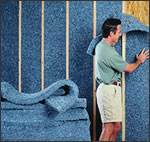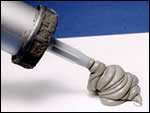Is Your Home Leaking Money?
More Articles
- Green Computers Save Energy and Cut Waste
- Green Homes: A Bright Spot in the Housing Market
- Geoexchange Systems Provide Energy - Efficient Heating and Cooling
- Rebates - Free Money for Your Efficiency Projects
- Don't Let Your Fireplace Burn a Hole in Your Wallet
- Families Compete to Save Energy in "Energy Smackdown"
- Making Solar Easy - New Options for Homeowners
- Recycle - Save Energy, Resources and the Environment
- Standby Power - The Silent Energy Drain
- The Fast and Easy Way to Cut Your CO2 Emissions
- The Fight Against Global Warming Comes Home
- Big Screens Mean Big Energy Bills
- Save Energy at the Tap

Old, drafty windows, leaks and cracks in air ducts and un-insulated attics are just a few of the places your home could be leaking heated or cooled air. When your home is leaking air you paid to heat or cool it's like throwing money out the window. Properly insulating and sealing your home's "envelope" or "shell" can save you up to 20% on heating and cooling costs.
Whether you do it yourself, or hire a contractor, there are a few key ways to improve the efficiency of your home:
- Seal Leaks: Your home, especially if it's older, could be leaking air from a number of places. Windows and doors are obvious places to check, and can be sealed with weather stripping, caulk or replaced if necessary. Less obvious are leaks coming from bathroom vents, outdoor faucets, crawl spaces, attic vents and other hidden areas. You may need special diagnostic tools to identify these hidden energy drains.
- Add Insulation: Even a well-sealed home will leak without proper insulation to keep heated or cooled air in. A well-insulated home will require much less energy to maintain a comfortable temperature, especially in extreme heat or cold. Insulation comes in many forms – fiberglass, cellulose, foam and reflective – and is installed in walls, attics, floors and crawl spaces. For more information on how much insulation your home should have, visit ENERGY STAR's website, or contact your local utility for energy audit information.
- Seal Ducts: If your house has a forced-air heating or cooling system, it relies on ducts to move that air around your home. The EPA estimates that 20% of heated or cooled air is lost due to leaky and poorly fitted ducts. Check all exposed ducts in basements, attics and crawl spaces for leaks and seal them with duct sealant. Also consider insulating any ducts that pass through especially hot or cold areas of your home.
 By making a few simple upgrades, you can dramatically cut the energy lost by your home's heating and cooling systems and improve indoor comfort at the same time. Before starting any efficiency project, contact your utility or check Flex Your Power's rebate finder for available rebates or technical assistance programs in your ZIP code.
By making a few simple upgrades, you can dramatically cut the energy lost by your home's heating and cooling systems and improve indoor comfort at the same time. Before starting any efficiency project, contact your utility or check Flex Your Power's rebate finder for available rebates or technical assistance programs in your ZIP code.










